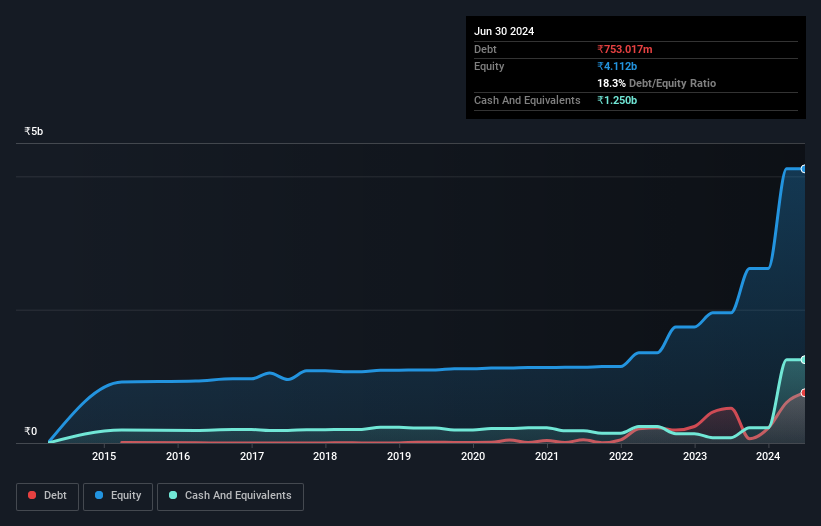Is Lloyds Engineering Works (NSE:LLOYDSENGG) A Risky Investment?
Legendary fund manager Li Lu (who Charlie Munger backed) once said, 'The biggest investment risk is not the volatility of prices, but whether you will suffer a permanent loss of capital.' When we think about how risky a company is, we always like to look at its use of debt, since debt overload can lead to ruin. As with many other companies Lloyds Engineering Works Limited (NSE:LLOYDSENGG) makes use of debt. But the real question is whether this debt is making the company risky.
What Risk Does Debt Bring?
Generally speaking, debt only becomes a real problem when a company can't easily pay it off, either by raising capital or with its own cash flow. Part and parcel of capitalism is the process of 'creative destruction' where failed businesses are mercilessly liquidated by their bankers. However, a more usual (but still expensive) situation is where a company must dilute shareholders at a cheap share price simply to get debt under control. By replacing dilution, though, debt can be an extremely good tool for businesses that need capital to invest in growth at high rates of return. The first thing to do when considering how much debt a business uses is to look at its cash and debt together.
View our latest analysis for Lloyds Engineering Works
What Is Lloyds Engineering Works's Net Debt?
The image below, which you can click on for greater detail, shows that at March 2024 Lloyds Engineering Works had debt of ₹753.0m, up from ₹522.0m in one year. However, its balance sheet shows it holds ₹1.25b in cash, so it actually has ₹496.7m net cash.

How Strong Is Lloyds Engineering Works' Balance Sheet?
Zooming in on the latest balance sheet data, we can see that Lloyds Engineering Works had liabilities of ₹1.40b due within 12 months and liabilities of ₹205.1m due beyond that. Offsetting these obligations, it had cash of ₹1.25b as well as receivables valued at ₹1.75b due within 12 months. So it can boast ₹1.40b more liquid assets than total liabilities.
Having regard to Lloyds Engineering Works' size, it seems that its liquid assets are well balanced with its total liabilities. So it's very unlikely that the ₹95.0b company is short on cash, but still worth keeping an eye on the balance sheet. Simply put, the fact that Lloyds Engineering Works has more cash than debt is arguably a good indication that it can manage its debt safely.
Even more impressive was the fact that Lloyds Engineering Works grew its EBIT by 105% over twelve months. If maintained that growth will make the debt even more manageable in the years ahead. There's no doubt that we learn most about debt from the balance sheet. But you can't view debt in total isolation; since Lloyds Engineering Works will need earnings to service that debt. So if you're keen to discover more about its earnings, it might be worth checking out this graph of its long term earnings trend.
Finally, while the tax-man may adore accounting profits, lenders only accept cold hard cash. While Lloyds Engineering Works has net cash on its balance sheet, it's still worth taking a look at its ability to convert earnings before interest and tax (EBIT) to free cash flow, to help us understand how quickly it is building (or eroding) that cash balance. Over the last three years, Lloyds Engineering Works saw substantial negative free cash flow, in total. While investors are no doubt expecting a reversal of that situation in due course, it clearly does mean its use of debt is more risky.
Summing Up
While we empathize with investors who find debt concerning, you should keep in mind that Lloyds Engineering Works has net cash of ₹496.7m, as well as more liquid assets than liabilities. And we liked the look of last year's 105% year-on-year EBIT growth. So we are not troubled with Lloyds Engineering Works's debt use. When analysing debt levels, the balance sheet is the obvious place to start. However, not all investment risk resides within the balance sheet - far from it. We've identified 2 warning signs with Lloyds Engineering Works , and understanding them should be part of your investment process.
If, after all that, you're more interested in a fast growing company with a rock-solid balance sheet, then check out our list of net cash growth stocks without delay.
Have feedback on this article? Concerned about the content? Get in touch with us directly. Alternatively, email editorial-team (at) simplywallst.com.
This article by Simply Wall St is general in nature. We provide commentary based on historical data and analyst forecasts only using an unbiased methodology and our articles are not intended to be financial advice. It does not constitute a recommendation to buy or sell any stock, and does not take account of your objectives, or your financial situation. We aim to bring you long-term focused analysis driven by fundamental data. Note that our analysis may not factor in the latest price-sensitive company announcements or qualitative material. Simply Wall St has no position in any stocks mentioned.
 Index Options
Index Options CME Group
CME Group Nasdaq
Nasdaq Cboe
Cboe TradingView
TradingView Wall Street Journal
Wall Street Journal